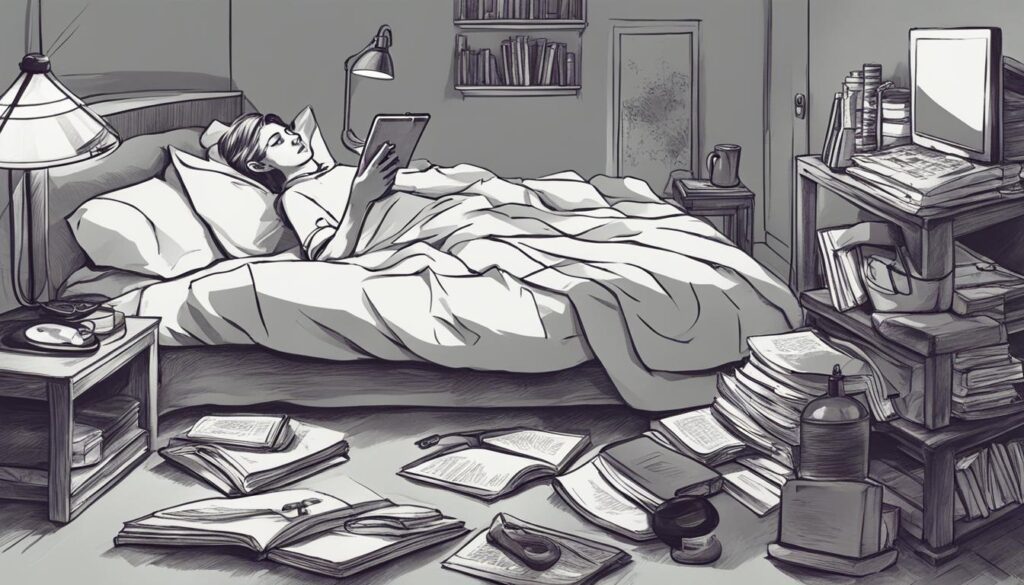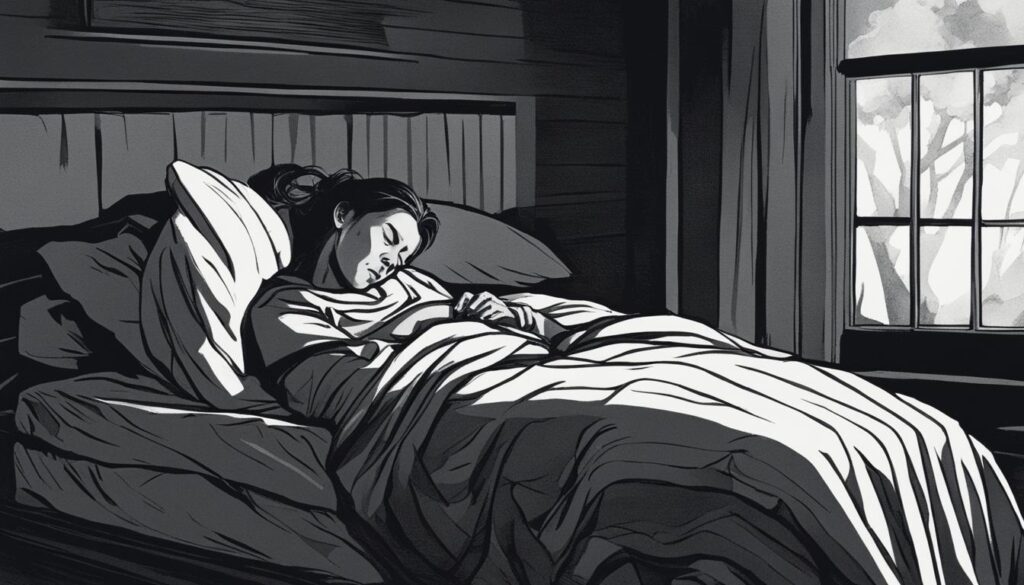Ever been awakened by an excruciating pain in your leg in the middle of the night? If so, you’ve likely experienced what’s known as nighttime leg cramps. These are sudden, involuntary, and painful muscle contractions that occur during sleep. Often disrupting your rest, turning what should be a peaceful night into a painful ordeal. This article covers what you need to know about preventing leg cramps at night and managing nighttime leg cramps to regain your peaceful night’s sleep.
Key Takeaways
- Nighttime leg cramps are sudden, involuntary contractions in the muscles of the leg during sleep, causing intense pain.
- Several factors such as age, pregnancy, lifestyle habits, and certain medications can increase the risk of experiencing these cramps.
- Regular stretching, satisfactory hydration, and maintaining an active lifestyle can play a significant role in preventing leg cramps at night.
- While generally harmless, frequent, severe nocturnal cramps may necessitate medical attention to rule out underlying conditions.
- Managing nighttime leg cramps effectively can greatly improve sleep quality and overall well-being.
What Are Nighttime Leg Cramps?
Nocturnal leg cramps, often referred to as leg cramps at night, are involuntary muscle spasms or contractions that predominantly occur in the calf muscles during the night. This common, yet frequently overlooked condition, can cause considerable discomfort and pain, with the affected muscles feeling incredibly tight and knotted.

Age, Pregnancy, and Lifestyle Factors
Nocturnal leg cramps seem more prevalent as we age. Pregnancy is another common time for muscle cramps during sleep to surface, as the growing baby can put pressure on nerves and blood vessels. Additionally, lifestyle factors can significantly influence these episodes. Elements like sedentary habits, improper sitting or standing for prolonged periods, inadequate hydration, and overexertion of muscles can directly contribute to the arrival of nighttime leg cramps.
Medical Conditions and Medicines Linked to Cramps
While nighttime leg cramps can happen spontaneously without any medical condition, a number of disorders and medications are known to enhance the likelihood of experiencing them. For instance, kidney issues, circulation problems, nerve damage due to diabetes, high blood pressure, thyroid problems, and dehydration are common medical conditions frequently associated with nightly leg cramps. Additionally, some prescribed medications such as diuretics, specific blood pressure and cholesterol treatments, and contraceptive pills can also trigger the occurrence of leg cramps during your sleep.
Differentiating Between Nighttime Cramps and Restless Legs Syndrome
Restless legs syndrome (RLS) and leg cramps are sometimes mistaken for each other due to the discomfort they both cause at night. However, they present distinct characteristics. Unlike the distressing cramps, RLS is primarily a neurological disorder and commonly not painful. It brings about an irresistible urge to move the legs while you’re resting or trying to sleep. So, despite both conditions may interfere with your sleep quality, they certainly represent different types of disorders.
| Condition | Description | Symptoms |
|---|---|---|
| Restless Legs Syndrome (RLS) | A neurological disorder causing an irresistible urge to move the legs | Uncomfortable sensations in the legs, urge to move the legs particularly during rest or at night, temporary relief with movement |
| Nighttime Leg Cramps | Involuntary contractions of the muscles, commonly in the leg, that occur at night | Sudden, intense pain, visible hardening of the muscle, symptoms usually occur at night |
By distinguishing these conditions, one can take the appropriate steps toward a more peaceful and less disrupted sleep. The next sections will address the implications of these cramps on sleep quality, strategies for immediate relief, long-term preventative measures and when to consult a doctor regarding your symptoms.
The Impact of Nighttime Leg Cramps on Sleep Quality
At times uninvited, nocturnal leg cramps often leave people in considerable pain, causing frequent awakenings. The underrated factor that ultimately disrupts sleep quality. These muscle cramps during sleep do not only pose a threat to a good night’s sleep but also tend to leave lasting effects like residual pain. This residual pain can linger for hours post-cramp, taking a toll on the person’s quality of life and productivity as it can lead to daytime fatigue.
Pain and discomfort caused by nighttime leg cramps may lead to secondary insomnia, a condition distinguished by difficulty returning to sleep after waking up due to pain or discomfort. This creates a cyclical pattern where the frequency and intensity of the cramps increase, leading to a consequential decrease in sleep quality.
Now, it is necessary to remember that maintaining good sleep hygiene and quality is integral to one’s overall health and well-being. It determines not only how you function during your waking hours but also plays a fundamental role in the body’s natural healing and repairing process, which mostly occurs during sleep.
Looking at the brighter side, the occurrence and effects of nocturnal leg cramps are manageable and subsides with time. Multiple strategies exist that can aid in relieving nighttime leg cramps and improving your sleep quality. These reliable tips and tricks will be discussed in the next section of this informative guide.
Treating Muscle Cramps at Night: Remedies and Preventative Measures
For many, nocturnal leg cramps can be an unwanted, painful interruption to a peaceful night’s sleep. There are, however, several remedies for nocturnal leg cramps that can provide immediate relief and others that can help prevent them in the long term. It’s important to remember though, in severe cases, consultation with a medical professional is recommended.
Home Remedies and Immediate Relief Techniques
Relieving nighttime leg cramps can often be accomplished using simple home remedies. Gentle stretching of the affected area, standing with your foot flat on the floor, massaging the muscle, flexing the foot, or applying a warm or cold compress are all ways you can try to relieve the discomfort.
Should you find yourself suffering from a cramp, try pulling your toes up towards your head while extending your leg. Another technique is to stand a few feet from a wall and lean forward, keeping the soles of your feet on the ground to stretch your calves. Gentle massage of the affected area can also help.
Long-Term Prevention: Stretching and Lifestyle Adjustments
Preventing leg cramps at night starts with putting in some proactive measures. Ensure you are adequately hydrated, and try to incorporate regular exercise into your routine. Stretching, particularly of the calf and foot muscles, can be especially beneficial. Avoid heavy or tight blankets that might constrict your leg movement during sleep, and if necessary, make a habit of wearing supportive shoes during the day.
When to Consult a Doctor: Signs You Shouldn’t Ignore
If your encounters with nighttime cramps persist despite your best efforts, or they’re accompanied by severe and frequent pain, it could be a sign of an underlying problem. In such cases, it’s critical to consult a healthcare professional. A doctor will be able to prescribe appropriate treatments and rule out any other underlying health issues that could be causing the cramps. Remember, knowledge is power when it comes to treating muscle cramps at night.
Conclusion
As we come to the end of our exploration of nighttime leg cramps, we recognize that although they can cause discomfort and disruption to our sleep, they are generally harmless. The intensity and frequency of these involuntary contractions can be managed effectively. Understanding the potential causes, such as specific lifestyle factors or even certain medications, is the first step to managing nighttime leg cramps.
Alongside understanding, practically relieving nighttime leg cramps is equally important when dealing with them. Techniques such as gentle stretching of the affected muscle, massaging it, or applying cold or heat as needed can provide immediate reprieve. However, the role of long-term preventative measures should not be downplayed. Incorporating regular exercise, proper hydration, comfortable footwear, and even adjustments in sleep environment can significantly assist in preventing leg cramps at night.
Nevertheless, it’s crucial to remember that when symptoms are severe or persistent, professional medical advice should be sought. Leg cramps may be the symptom of an underlying health issue that needs to be addressed. Seeking the appropriate treatment and following medical advice ensures better management of this condition. By taking these steps towards managing nighttime leg cramps effectively, we not only aim to improve sleep quality but also enhance overall well-being.





